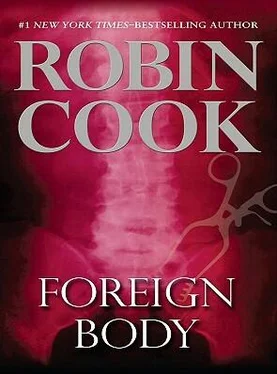October 16, 2007
Tuesday, 11:02 p.m.
New Delhi, India
The wheels of the wide-body jet hit hard as they touched down on the tarmac of the Indira Gandhi International Airport and jolted Jennifer awake. She’d been awakened twenty minutes earlier by one of the cabin attendants to raise the back of her seat as the plane had started its initial descent, but she’d fallen back asleep. The cruel irony was that during most of the final leg, she’d not been able to sleep until the last hour.
Pressing her nose against the window, Jennifer tried to appreciate her first images of India. She could see little more than the runway lights streaking by as the powerful engines reversed. What surprised her was what looked like fog obscuring the view toward the terminal. All she could see were hazy, individually illuminated airplane tails rising up out of a general gloom. The terminal itself was a mere smudge of light. Raising her eyes, she saw a nearly full moon in the apex of a dark gray sky with no stars.
Jennifer started arranging her things. Lucky for her, the neighboring seat had been vacant, and she’d taken full advantage with the surgery book, the India guidebook, and the novel she’d brought for the flight — or, more accurately, the three flights. Her itinerary required two stops, which she’d actually appreciated as an opportunity to stretch her legs and walk, but only one change of aircraft.
By the time the big plane had nosed into the gate, and the seat-belt sign had gone off, Jennifer had her carry-on items packed away in her roll-on but then had to wait while others closer to the exit slowly filed out. Everyone looked as she felt: exhausted, yet having landed in a strange and exotic country, she could feel herself enjoying a second, or maybe a third or fourth, wind. Despite the fact that she was coming to deal with her beloved grandmother’s death, she couldn’t help but feel a certain excitement as well as nervousness.
The flights themselves, although remarkably long, had been endurable. And contrary to her initial worry that their duration might give her too much free time to obsess about the loss of her closest friend, it seemed to have been the opposite. To some degree, the forced solitary time had allowed her to come to terms with the loss by tapping into one of the lessons she’d learned from studying medicine: that death was very much a part of life, and its existence was one of the things that makes life so special. Jennifer wasn’t going to miss her grandmother any less, but her loss wasn’t going to paralyze her.
Once off the plane, Jennifer walked through the mildly dilapidated and dingy terminal building, finally appreciating that she was truly in India. On the plane everyone had been in Western clothes. Now she started to see bright-colored saris and equally bright-colored outfits on women she would later learn were called salwar-kameezes. On men she saw long tunics called dhotis over either voluminous lungis or pajamas, which were loose pants snugged at the ankles.
With some concern that she might face a problem, Jennifer approached her first potential hurdle: passport control. She couldn’t help but notice that the lines were long and moving slowly for the few booths occupied by border agents both for citizens and for tourists. On the other hand, the line in front of the diplomatic booth was completely free. Its occupants were either chatting or reading newspapers. With little confidence in bureaucracy in general, and India’s in particular, thanks to what she’d recently read in the guidebook, Jennifer fully expected to have a problem because she was not carrying a visa, even though the airline had been so apprised. It all depended on Mrs. Kashmira Varini and whether she’d made the call she promised and whether she had spoken to the right people.
“Excuse me,” Jennifer had to call out at the booth’s window to get attention. Conversations stopped and newspapers were lowered. The rather large group manning the diplomatic line, in sharp contrast to the other booths, which were occupied by single agents, all stared blankly at Jennifer as if shocked that they had business. All the agents were wearing saggy brown uniforms, and although the clothes were not obviously soiled, everybody appeared mildly disheveled.
As directed, Jennifer handed over her passport and began to explain the situation, when the border agent slid back the passport, and without speaking motioned for Jennifer to use one of the other lines.
“I was specifically told to come to the diplomatic window,” Jennifer explained. Her heart sank as she began to worry about possibly not getting into the country after such a long trip. Hurriedly, she related that she’d been instructed that a visa would be waiting for her specifically at the diplomatic window.
Still without speaking a word to Jennifer, the border agent picked up his phone. Even from where she was standing outside the booth, she could hear some shouting on the other end of the phone line. A minute later, she watched as the agent opened a drawer beneath the countertop he was sitting at and extracted some papers. He then motioned for Jennifer to hand back her passport, which Jennifer was happy to do. The agent then glued into it what she assumed was a visa, initialed it, and then stamped it. Only then did he slide it back out to Jennifer while motioning for her to pass. With relief at being allowed to enter the county after fearing for the worst and surprised at not having to pay for the visa, Jennifer grabbed her roll-on and quickly moved on in case they changed their minds. It was curious the episode had happened without the agent’s speaking one word to her, which reminded her why she disliked bureaucracy.
Next was baggage, which surprisingly turned out to be more efficient than it was at JFK. By the time Jennifer had located the correct carousel, her wheeled bag was there, having already made several circuits.
The customs agents appeared even more rumpled than the passport people, and even less engaged. They all were sitting on the edges of the long countertops that had been built to facilitate opening and examining luggage, but no one was doing either. Dutifully, Jennifer slowed, but they merely waved her on.
Jennifer then pushed through the customs security doors and entered the terminal’s main arrival area. Immediately, she had a presage of one of India’s main characteristics: an impressive population. The place was mobbed. Although the arrivals part of the terminal had been crowded thanks to multiple international flights landing almost simultaneously, it was nothing like the rest of the terminal. Just beyond the doors was a thirty-foot-wide upward-sloping ramp more than eighty feet in length and lined with a metal handrail. Pressed against the handrails and pancaked against one another like sardines were hordes of expectant people, most holding up crude signs. About half the crowd was in Western dress, including a large number outfitted in fancy uniforms with visored hats sporting hotel insignias.
Jennifer stopped in her tracks, taken aback by this new quandary. Having been told she would be met by an Amal Palace Hotel employee holding up her name, she’d not concerned herself with this aspect of the journey. Clearly, that had not been a wise move. From her vantage point there could have been thousands of signs and even more people.
Never happy to be the center of attention, Jennifer nonetheless tried to make herself apparent as she gradually made her way up the incline. As she vainly looked for her name, she invariably briefly locked eyes with strangers, each of whom appeared to be more foreign and exotic than the next. As a young single woman with essentially no travel experience, it was intimidating, even a little scary, especially with no police or other authorities in sight.
Читать дальше












